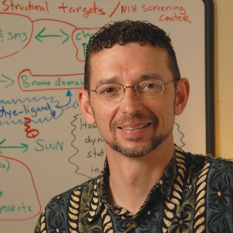Stephen Frye, Ph.D.
Professor, Chemical Biology Medicinal Chemistry
 PHONE
PHONE(919) 843-5486
svfrye@email.unc.edu
ADDRESS
3206 Marsico Hall, 125 Mason Farm Road, CB# 7363, Chapel Hill, NC, 27599-7363
DOWNLOAD CV
Elected 2021 Fellow to the American Association for the Advancement of Science for his distinguished contributions to the field of oncology drug discovery, including new treatments for benign prostatic hyperplasia, metastatic breast cancer, renal carcinoma and soft tissue sarcoma.
Dr. Stephen Frye is currently a Professor in the Center for Integrative Chemical Biology and Drug Discovery (CICBDD) which he previously directed at the University of North Carolina at Chapel Hill (UNC). Prior to joining UNC to create the CICBDD in 2007, Dr. Frye was the world-wide vice president of Discovery Medicinal Chemistry (DMC) at GlaxoSmithKline (GSK). Dr. Frye led DMC for seven years, overseeing five departments and more than 200 chemists in the U.S. and U.K. developing global protein target-class chemical science for GSK. During his 20-year career at GSK, the teams led by Dr. Frye successfully developed three FDA approved drugs: Avodart, a dual 5a-reductase inhibitor for treatment of benign prostatic hyperplasia, Tykerb, a dual erbB2/EGFR inhibitor for the treatment of metastatic breast cancer, and Pazopanib, a multi-targeted receptor tyrosine kinase inhibitor for the treatment of renal cell carcinoma and soft tissue sarcoma. As founding director and current faculty member in the CICBDD at UNC, Dr. Frye plays a key role in translational research through collaborative drug discovery projects with other UNC faculty. A clinical candidate from one of these projects created in the Center is now progressing through multiple human trials. In addition, his lab has established a leading program in the area of chemical biology of chromatin regulation with an emphasis on protein-protein interactions dependent upon lysine methylation. Dr. Frye has published more than 130 papers in the fields of organic and medicinal chemistry.
Research
In addition to establishing collaborative drug discovery projects since joining UNC in 2007, Dr. Frye initiated a more basic research program in his lab focused on methyl-lysine (Kme) as a post translational modification (PTM) central to the regulation of chromatin. This research has explored the ligandability of the more than 200 Kme reader domains that occur in several protein families within the human proteome with the goal of discovering the first chemical probes for these domains. The primary intent of a chemical probe is to establish the relationship between a molecular target, usually a protein whose function is somehow modulated by the probe, and the broader biological consequences of that modulation. In order to fulfill this purpose, a chemical probe must be profiled for selectivity, mechanism of action, and cellular activity, as the cell is the minimal system in which ‘biology’ can be explored. Dr. Frye’s published work has begun to define the assays and chemical strategies for probe development in this target-class, as well as new directions required for future progress.
Learn More about the Center for Integrative Chemical Biology and Drug Discovery
-
UNC5293, a Potent, Orally Available and Highly MERTK-selective Inhibitor
-
Reprogramming CBX8-PRC1 Function with a Positive Allosteric Modulator
-
Discovery and Optimization of 2H-1λ2-Pyridin-2-one Inhibitors of Mutant Isocitrate Dehydrogenase 1 for the Treatment of Cancer
-
Discovery of an H3K36me3-Derived Peptidomimetic Ligand with Enhanced Affinity for Plant Homeodomain Finger Protein 1 (PHF1)
-
Improved methods for targeting epigenetic reader domains of acetylated and methylated lysine
- Probing Allostery in Methyl Lysine Reader Domains
- American University, Washington, D.C., October 1997 to December 1998
Graduate certificate in Organizational Change-Leadership - University of North Carolina at Chapel Hill, 1983 to 1987
Major: Organic Chemistry, Adviser: Professor Ernest L. Eliel
PhD, May 1987, Dissertation: “Stereoselective Syntheses Based on Chiral 1,3-Oxathianes: Synthesis of Mevalolactone and Citramalic Acid and Investigation of the Mechanism of Diastereoselection” - Off-Campus Graduate Fellow, Institut de Chemie Organique, de Université de Lausanne, Switzerland, March to September 1986
- North Carolina State University, 1979-1983
Major: Chemistry, Minor: Polymer/Textile Chemistry
BS, Summa Cum Laude with Honors, May 1983

